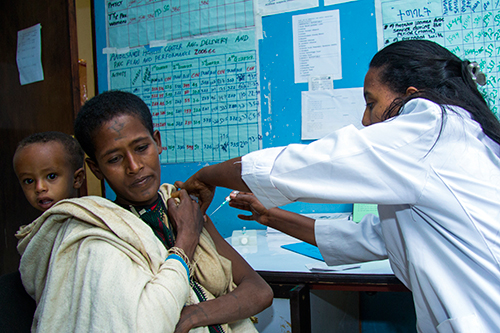News
Historic new Global Goals unanimously adopted by United Nations
- 25 September 2015
News
UNITED NATIONS, New York – World leaders today unanimously adopted a historic set of global goals on eliminating poverty, achieving gender equality, and securing health and well-being for all people, at the opening of the three-day Sustainable Development Summit taking place at United Nations Headquarters in New York.
The acceptance of this bold new agenda – the culmination of years of research and negotiation – was met with raucous cheers and a standing ovation by representatives of the 193 UN member states.
“It is an agenda for the planet, our common home, an agenda for shared prosperity, peace and partnership,” said Secretary-General Ban Ki-Moon. “It conveys the urgency of climate action. It is rooted in gender equality and respect for the rights of all. Above all, it pledges to leave no one behind.”
“UNFPA, the United Nations Population Fund, commends world leaders on the adoption of the 2030 Agenda for Sustainable Development – a significant achievement in the history of development,” said a statement released by UNFPA shortly after the Goals’ adoption. “The implementation of this forward-looking and universal agenda can lift millions from poverty, save and transform the lives of billions of people, and protect our planet.”
The 17 goals – known as the Sustainable Development Goals, or simply the Global Goals – aim to transform the world over the next 15 years. They build on the success of the Millennium Development Goals, global objectives adopted in 2000 that have helped to improve the lives of millions of people around the world.
Like the Millennium Development Goals, the Sustainable Development Goals address poverty, hunger, gender inequality, preventable deaths and environmental degradation. But these new goals are much broader in scope, comprising 169 targets, which together intend to usher in an era of development for all people, everywhere.
UNFPA is working with governments, partners and other UN agencies to directly tackle many of these goals – in particular Goal 3 on health, Goal 4 on education and Goal 5 on gender equality – and contributes in a variety of ways to achieving many of the rest.
“World leaders have shown their firm commitment to eradicating poverty, ensuring individual rights and well-being, and universal access to sexual and reproductive health, including family planning, for all. They committed to promoting gender equality and women's and girls’ empowerment,” the Fund’s statement said, adding, “UNFPA is fully committed to supporting every woman, man and young person to walk that path.”

The Sustainable Development Goals are ambitious, and they will require enormous efforts across countries, continents, industries and disciplines – but they are achievable.
“The world needs a change. It cannot change itself. It’s me, it’s you. It’s all of us who have to bring that change,” girls’ rights advocate Malala Yousafzai said to the assembled leaders.
The adoption of the Goals comes on the 70th anniversary of the founding of the United Nations, the Secretary-General reminded attendees. “Seventy years ago, the United Nations rose from the ashes of war. Governments agreed on a visionary Charter dedicated to ‘We the Peoples’. The agenda you are adopting today advances the goals of the Charter,” Mr. Ban said.
“It embodies aspirations of people everywhere for lives of peace, security and dignity on a healthy planet. Let us today pledge to light the path for this transformative vision.”